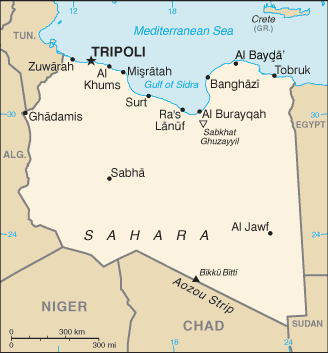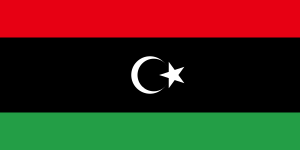Libya

Libya (formerly the Great Socialist People's Libyan Arab Jamahiriya) (now that's a long name) is a North African country located between Egypt and Tunisia and bordered by the Mediterranean Sea.
One of the most authoritarian of the Arab states for many years, it was ruled from 1969 to 2011 by Muammar Gaddafi (معمر القذافي), a man who had an Amazon Brigade of Bodyguard Babes and had his name transliterated at least 30 ways[1]. He was universally considered a bit... uh, quirky. Officially, Libya under Gaddafi was a socialist country ruled by its people through a form of direct democracy, an ideology which Gaddafi characterised as a third way between capitalism and communism and which was laid out in his self-penned "Green Book", with the Colonel himself having no official position within the state and instead being a "guide of the revolution" who merely oversaw the country. Unofficially, you can probably work it out.
Of particular note is Libya's relationship with the world, especially during the 1980s. Very widely believed to be a state sponsor of terrorism/freedom fighting, arming the IRA among many others (it was and still is anti-Israel), this naturally did not go down well with the USA. There were two incidents in the (claimed by Libya) Gulf of Sidra, where Libyan jets attacked American F-14s and were duly blown out of the sky. Most notable of all was Operation El Dorado Canyon, a 1986 aerial attack by the US, in response to a terrorist attack, that killed 60 people, including the Libyan leader's adopted daughter (possibly). Two of these inspired works of fiction.
In 2003, Mr. 37 Spellings reconciled with the West somewhat, gave up his WMD programme and got Libya taken off the US "state sponsors of terrorism" list. In 2009, he delivered a 96-minute rant at the UN General Assembly against the United Nations Security Council, chucking away a copy of the UN Charter and bringing up Conspiracy Theories galore, and made controversial statements regarding Switzerland. The fact that Libya chairs the General Assembly at present meant he was allowed to do this.
Under Gaddafi, Libya also tried to destabilize its African neighbors and profit from the resulting weakness. This didn't work out too well, as Libya proceeded to get its ass kicked by Egypt and Chad, the latter war actually serving to reinforce Chadian unity as the various factions fighting for control of the country teamed up to fight the Libyans. Helping Uganda's Idi Amin in his invasion of Tanzania also blew up in Libya's face. The nation also has an ongoing feud with Sudan.
Ethnically Libya is mostly a mix of Berbers and Arabs, although the lines are blurry thanks to (1) intermarriage and (2) the fact that many if not most even relatively unmixed Berbers speak Arabic and only Arabic.
Despite the authoritarian regime, the standard of living in Libya is rather decent, especially if compared to other African countries. This is partly because Gaddafi genuinely distributed the oil wealth quite well, and partly because it only has to go around 6 million Libyans (as opposed to 30 million Algerians or 70 million Egyptians).
During World War Two, Libya (ruled by Italy) was the scene of a number of major battles, including the siege of Tobruk.
In February 2011, Libya experienced an armed uprising against the Government of Muammar Gaddafi, influenced by the Arab spring. The brutal crackdown was condemned worldwide, and caused many Libyan soldiers to defect, which Gaddafi responded to by hiring mercenaries. On March 19, the U.N. approved a no fly zone over Libya, complemented by air strikes. On October 20 2011, Gaddafi was killed in Sirte, and lost complete control of the country. Both sides committed war crimes before and during the 8 month civil war.
As a last, curious note: Their flag was completely green during Gaddafi's regime. The green was supposed to represent Gaddafi's devotion to Islam. The rebels in the 2011 war adopted variants of the old flag of the monarchy (red, black, and green horizontal stripes, with a white star and crescent in the middle) as a symbol; after the defection of the Libyan ambassador, it was the flag that flew over the Libyan Mission to the United Nations, and became the official flag of Libya after the captures of Tripoli, and later Sirte.
Libya in fiction:
During the 1980s, Libya was near the top of the Hollywood Axis Of Evil list, up there with the Soviet Union and East Germany. This was majorly helped by the fact that Libya received Soviet arms (then annoyed the Soviets by losing a load of them in a war with Chad), funded the IRA and carried out or supported terrorist attacks that killed Americans.
The Gulf of Sidra incident in 1981 inspired Top Gun, while El Dorado Canyon inspired very directly (including going around France and Spain) an attack on a Qurac in a novel called Eagles.
Not counting the Qurac clones:
- Airwolf- Dr Moffett takes the chopper there after he steals it.
- Patriot Games.
- Also used as a source of terrorists in Back to The Future.
The Libyan flag

- ↑ Wikipedia pronounces it Muammar al-Gaddafi, or Colonel Gaddafi for short.